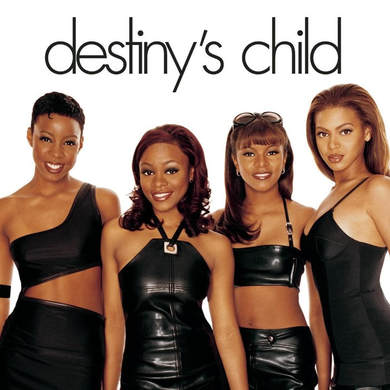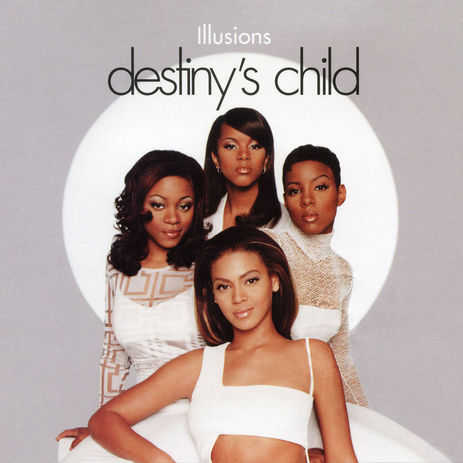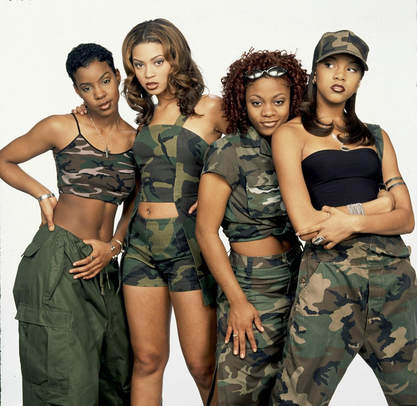 D.C. totally didn't look 17 on their debut album cover (Columbia)
D.C. totally didn't look 17 on their debut album cover (Columbia) From my perspective, the things that supposedly make the debut a misstep are what render it a golden, indispensable part of D.C.'s discography. One of the reasons the Jackson 5's "Who's Lovin' You" is so remarkable is that Michael Jackson was able to convey the anguish of a broken, grown man at age 11. The "too mature" material and "antiquated" musical production of Destiny's Child allowed the foursome to give a similarly impressive first testament to their ability. It commences with what I've jokingly described as 'the gates of Rock N' Roll heaven opening up' on "Second Nature." A declarative bluesy guitar riffs, before celestial harmonies enter over the rolls of a harp (or a piano, haha). Pointed plucks and percussion accentuate the sample of The Isley Brothers' "Make Me Say it Again" (1975), as Beyoncé questions, "Why does love always seem so very hard?" On top of this classic groove, she convincingly sings about serial relationship stumbles, instinctual devotion and giving all of herself, as if she knew something about any of it. The track is hypnotic and succulent until the very last drop. Like a chocolate with secret filling, the remaining 30 seconds unexpectedly wanders away from the main layout. Twinkling cymbals and piano take precedence over the guitar, then it beautifully fades to black. It's easily my favorite; it hits the spot.
Save for the 'designed for radio' singles "No, No, No Part 2" and "With Me Part 1," "Second Nature" sets the tone for the rest of the album. It's buttery musical and vocal arrangements (ex. "No, No, No Part 1"), vintage inspirations (ex. "Birthday"), and believable sung performance are heard throughout. D.C.'s execution of The Commodores' "Sail On" (1979) is nothing short of extraordinary. Their mellifluous and tender delivery expresses the romantic disillusionment of the verses, while their detectable confidence portrays the resilient attitude of the chorus. They sway between the two postures with consummate fluidity; there's isn't anything 'freshman' about it. Absolutely heart-tugging, their R&B-converting cover did more to capture the song's premise than the unaffected, country-farcing original ever did.
On the immersing "Killing Time," the youngster's ghostly and pained voicing helps sell the adult despondency that comes when a troubled loved one pushes you away. Like "Second Nature," a solo soulful guitar is the initiator. A whispering flute follows, leading to D.C. and a taunting 'tick' that persists to the end. Tranquil, yet ornate strings further dramatize the air. Usually, emotive peaks are placed at the bridge, and room is left for a cool down. Beyoncé pushes the benchmark well past that, with cogent and heady work that keeps the track touchy through the close (she does the same on the stirring "My Time Has Come"). She eventually gives a defeated sigh, as the 'clock' ticks on and the strings quiet. I get completely lost in it; it's so gorgeous. The tune is technically D.C.'s first single, appearing on the July 1997 Men in Black soundtrack.
D.C. didn't abundantly sing in such a careful, impassioned manner again until 2004's Destiny Fulfilled. Beyoncé in particular altered or ceased to do a number of things stylistically. Part of what makes her a joy to take in are the varying shades of her voice. I'm in love with her warmer and lower tones, of which there's a higher concentration on Destiny's Child. There's also this deliberate enunciation and phrasing she uses that emphasizes feeling or adds character to wording. The tactic remained a signature of hers, but it's commonly applied in all its glory on stage. My favorite example is the playful and cutesy way she says "Sugah, sugah" at the end of "Bridges'" first verse (another go-to cut for me). Going forward, some would say her standard delivery was excessively premeditated and technical, and subsequently missing emotion.
 I personally always skip "Illusion" (Track 10), but someone loved it enough to make faux cover art
I personally always skip "Illusion" (Track 10), but someone loved it enough to make faux cover art This idea that D.C. moved on to greener, commercial pastures and never looked back couldn't be further from the truth. As briefly mentioned earlier, their genesis was the entire basis for their final curtain, Destiny Fulfilled. It was a sister project through and through, from the luscious 70's references and balmy atmosphere, to the duo of radio singles that deviated from the tracklist (i.e."Lose My Breath" and "Soldier"). Having increasing songwriting and producing agency since Writings, the ladies were able to make enhancements to their fundamental blueprint. The former themes of staunch dedication and loss were adapted into a more inspiriting, unfolding story about identity and post-breakup healing (Beyoncé and Michelle's siblings, Solange and Erron, co-wrote "Bad Habit" and "Love," correspondingly). Instead of Beyoncé having the lion's share of the lead vocals, they were evenly distributed (akin to Survivor). The change highlighted the group's blending skills and asserted that they were in fact a collective effort. In hearing every member vividly, it was observable how they contributed to and were essential in engineering the D.C. tone. Each distinctive voice was necessary in complimenting and balancing the other. What they generate as a whole, both sonically and in presence, they can't easily replicate individually. Hence, me having hunger pains for a studio reunion and/or tour, but I digress. Musically on Fulfilled, they were unapologetic about their not so mainstream roots. The adjustments from the prior design were minor, with just a thin coat of current rhythmic taste and clearer production. Destiny's Child had this muffled film over it, which might've been a factor in why it was perceived as dated. Cloudiness is typically a symptom of a low budget or someone taking a shortcut, but the haze boosted the album's charm ("With Me Part 2" sounded the cheapest; go figure).
D.C.'s omega being an improved companion to their alpha was an excellent way to remind listeners of their core and illustrate their ample growth. Progression, or regression for that matter, can be quite evident when two comparable models are side-by-side. D.C. fulfilled the promise they displayed at onset (pun totally intended), and teased what they could bring in the future.
Despite Fulfilled's similar yesteryear influences and mature subject matter, the reception was more embracing than it was with Destiny's Child. One negative adjective from 1998 that didn't resurface in 2004 was "inappropriate." Early 20-somethings imparting the life clarity of women twice their age is definitely hard to believe. However, it's much easier to digest than teenagers singing about things like knowing how to get and keep a man (i.e. "With Me;" that song keeps coming up). Ever see the video for "No, No, No Part 1?" D.C.'s 17-year-old members were covered in makeup (specifically 'night' looks) and wearing skin baring threads, while sultrily performing in a lounge setting. "Your friends can't do what I can for you," cooed YoungOncé. It was a lot. The sophomore Writing's was musically contemporary and upped the ante on scandalous adult topics, but ironically, it was dubbed childish by some reviewers. A great philosopher once said "You can't win chile', you can't break even and you can't get out of the game." Fulfilled escaped adjectives such as "unfashionable," likely because it fit better into its surrounding landscape. Some hits from the period include Alicia Keys' "You Don't Know My Name," R. Kelly's "Step in the Name of Love" and Anthony Hamilton's "Charlene." What was deemed anachronistic just six years before was now in vogue. This suggests that maybe Destiny's Child wasn't an "antiquated one-off," but ahead of its age and more influential than realized. Perhaps it evaded the concept of time altogether.
 "Survivor" realness before "Survivor" (1998)
"Survivor" realness before "Survivor" (1998) Beyoncé may have her misgivings about D.C.'s premiere, but it gave way to her obsession with musical immortality. In many an interview and behind-the-scenes filming, she explained 'timelessness' was the target for her solo launch, Dangerously in Love (2003). She told one reporter, "I'm not interested in the moment. I'm interested in how this is going to sound in 30 years' time." The LP too relied on 70's and 80's notes, which executives allegedly contested. She presumably leaned into their expectations, with B'Day (2006) and I Am...Sasha Fierce (2008) being more updated. She later implied these records weren't "classic" and comprehensive bodies of work, and that 2011's 4 would aspire to be so. Since then, she's focused on surprise "visual albums." Packaged with symbolic images and film, the goal of these is to revive the 360 listening experience. She's definitely not going for 'temporary.'
Those penning Destiny's Child anniversary articles didn't consider this possible connection, or any others. For them, the milestone was merely an excuse to post something related to the trendy topic of Beyoncé and get website hits. So, they regurgitated ideas from 20 years ago, slapped on some shallow observations, and called it a night. I think I've thoroughly explicated just how off-base those vecenarian ideas were, but I have a cherry to put on top. 1998's critics cast D.C. aside as an unremarkable act to be forgotten. Yet, they outlasted and outdid their contemporaries. To this day, they're one of the top five best-selling female groups of all-time. Having built a shining legacy, the public's desire for them hasn't waned. A Time magazine infographic from June 2011 ("Destiny's Portfolio") reported that they sold 25,000 albums so far that year, which was long after their disbandment. Whether it's an internet challenge or a live performance, the ladies cause a frenzy each time they share oxygen. Their reunions at the 2013 Superbowl and this April's Coachella festival triggered colossal sales increases. Their continued marketability and past history-making status often have them on "Best" lists by music and record-keeping entities. The traits most discussed are their garish outfits, trademark sound, and positive, pro-woman messages. The girl-group wave has calmed since the 2000's, but those who stand now nod to D.C. On their single "That's My Girl," post-2012 troop Fifth Harmony reminds, "Destiny said it, you got to get up and get it, get mad independent and don't you ever forget it." So much for being unmemorable, huh?
People want to pretend that D.C.'s whole story is Survivor or that Beyoncé invented herself, but facts are facts. All that they were and are rests on a little ole' self-titled diamond in the rough. Destiny's Child is where they "went from a dream, to the young Supremes," as said on "Illusion." Though that's the only track that harkens back to D.C.'s childhood start as the rapping/singing Girls Tyme, I always skip it. Am I the only one? Haha.
Related Reading:
-Bey's Wax: The Discography Analyzed (2012)
-10th Anniversary: Destiny Fulfilled (2014)


 RSS Feed
RSS Feed